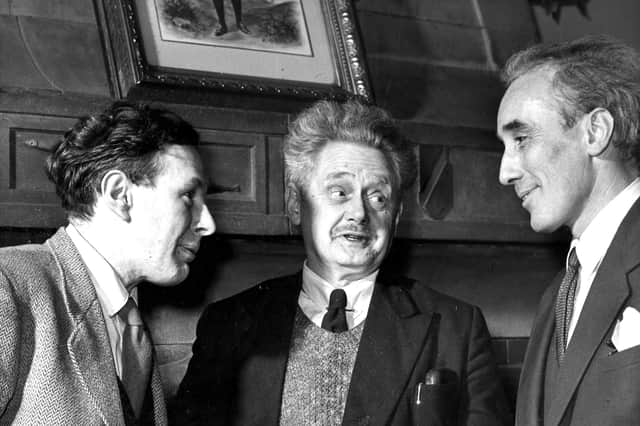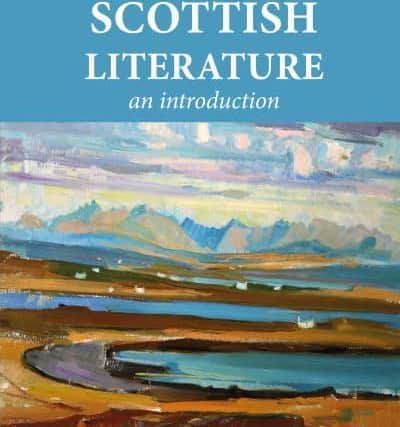Book review: Scottish Literature: An Introduction, by Alan Riach


Do we need another history of Scottish Literature? In my lifetime there have been many; by Robert Crawford, Gerard Carruthers, Carla Sassi, Maurice Lindsay, Roderick Watson, as well as anthologies edited by Cairns Craig and by Douglas Gifford, and indeed by Alan Riach. Still, there is room at the ceilidh for a second turn. But what makes it new?
The presiding spirit over this book is Hugh MacDiarmid, about whom Riach has written a sensitive, insightful and careful book, Hugh MacDiarmid’s Epic Poetry. Indeed, MacDiarmid has more citations in the index here than Burns or Scott. Riach has something of MacDiarmid’s style in this mammoth trudge through the centuries. He may shine a light on the forgotten or have clever insights into the weel-kent, but there is an irascible, judgemental, poorly considered tone. Is this mammoth tome of 750-odd pages for “the generally curious” as well as for “scholars”? The scholars may wonder at the lack of footnotes. It contains a “loose canon” of Scottish writing, with an acknowledgement of the provisional nature of any canon. That said, it is curious that the fine poet Gael Turnbull is in the putative canon, but never discussed in the book. Of course, it would be impossible to write about everything ever written in Scotland, or by Scots outside Scotland, or inspired by Scotland. So one wonders again: why?
Advertisement
Hide AdThe agenda is clear. At one point Riach sets up a straw man by quoting an 18th century condemnation of the (in my opinion) minor 16th century play Philotus. “In the 21st century”, opines Riach about the dismissal of the play, “it’s high time we moved beyond such nonsense. Who wouldn’t much rather see a production of this play, full-funded and properly mounted, than anything by Andrew Lloyd Webber?” Book me a ticket for Cinderella.


The hyperbole and snide asides continue. Apparently, “the arts are the genius of your country” (which rather implies the envisaged readership), “Without them you have nothing. And education is the key. That’s the only way we unlock the door to independence”. This is polemic, not criticism. Arthur Conan Doyle is dismissed as “a continuity of adventure surfing the high curling waves of the long declining empire, and heading for the rocky shores”, along with Stevenson, Buchan and Fleming. Then, in a passage MacDiarmid would have loved, we are asked “Is modern culture so shy of reconsidering our inherited file of theatrical history? That is not to be dismissed with a shrug and acceptance of the proverbial ‘Scottish Cringe’. What does that phrase mean anyway? Nothing less than a vast psychological trap of conditioning into massive cultural self-suppression. Well, pilgrims, if we’re going to be avalanched by a stupendous vomitarium of ‘British’ cultural priorities, with fools, horses, grandad’s armies, carry on empires and Great Brutes of Britishness, we’ll need to do a lot more than we have done so far”. I hope I am allowed to admire Dinner Ladies and Ever Decreasing Circles and The Rise And Fall Of Reginald Perrin as well as the Rev IM Jolly.
Which brings us to religion, against which Riach seems to have a degree of animus. “Calvinist” and “Knox” are trigger words in this; “pagan” is always benign. Any praise of the Church is begrudged, and the lack of any engagement with Gude and Godlie Ballads, or the satirical ballads by the Sempills, or the work of Melville or Rutherford’s Lex, Rex shows a significant blind spot. Again, there is a note of hauteur whenever issues around faith occur, despite its centrality to Scottish history. Most sermons were “sludge”, which does a great disservice to the many who wrote eloquently and approached the pulpit with steely trepidation.
This book does have nuggets that I will follow, but too often the works of an author are merely listed, not examined or scrutinised. It is a strange missed opportunity. Had Riach written, say, “Twelve Underrated Scottish Authors”, it might have been a far more useful intervention in the debates about national literature. There is no or little point in listing the omissions; it is pertinent to point out that Andrew O’Hagan, thrice listed for the Booker, is given a measly paragraph, while minor poetasters have pages devoted to their work.
As I have said, Riach is a critic whose work I have learned much from, and I learned a little more here. But this book is somehow unworthy and ungracious. The divided nation remains divided. All the praise of Scotland’s polyphony and diversity and multi-faceted and plural nature counts as naught if even its strengths are forced to march to a drum. The arts, as Riach rightly argues, are not a luxury. Neither are they an implement.
Scottish Literature: An Introduction, by Alan Riach, Luath Press, £25